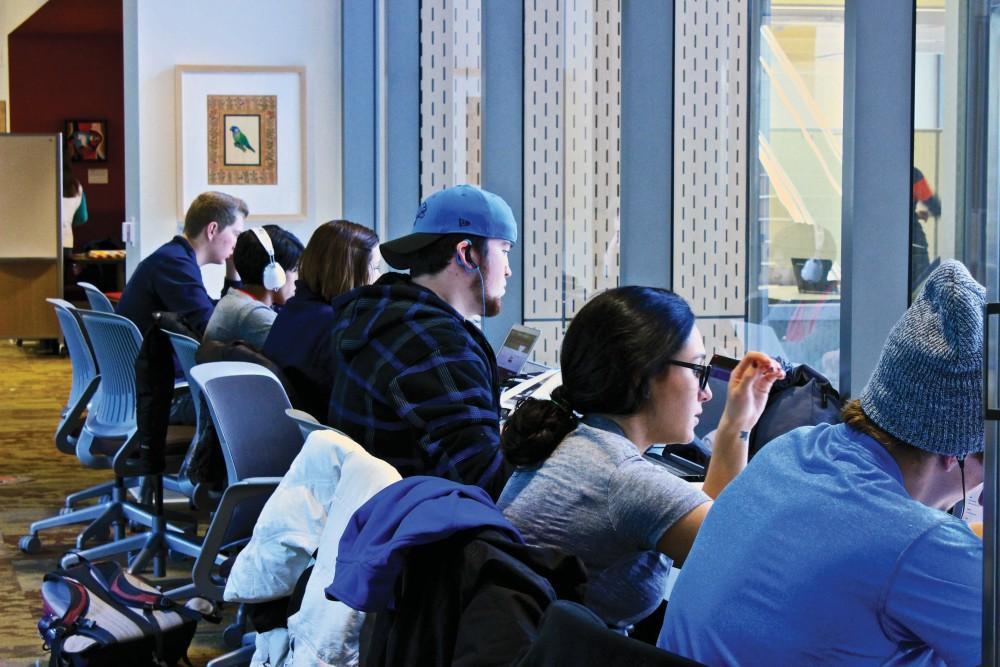Study tips for science students

GVL / Archive
Sep 2, 2015
Classes have started, meaning that exams aren’t very far away.
During the first few weeks of class, it can be critical to start off on the right foot. That’s why Grand Valley State University’s physics department offers a workshop for students. The workshop offers helpful study tips that students can utilize throughout the semester and any future physics courses that may await them.
The workshop will be held in Padnos Hall, Room 308 from 5 p.m. to 6 p.m. on Thursday, Sept. 10.
Karel Swanson, senior academic advisor, coordinates a series of workshops throughout the school year, including the physics workshop. Workshops are offered for other science courses as well, such as biology, chemistry and biomedical sciences.
“We want students to understand that you study differently for different courses,” Swanson said. “When you hear right from the faculty directly, that’s the best way to get that information because they know what’s required to be successful in their courses.”
Swanson explained that rather than have one workshop geared towards study tips in general, it was much more logical to break it up by course because students don not study the same for physics as they do for biology or biomedical science.
It is important that the workshops differ from a private tutor session, although Swanson said this may be a good idea for some students if they are struggling in a course. Swanson said workshops are aimed at helping students find good, solid study techniques that will help them through the entire course.
During the workshop, physics staff members and high-achieving students will be present to address any concerns that incoming physics students may have.
“Whenever students hear from other students ‘What did you do? How did you get through this course?’ that’s always helpful information,” Swanson said.
Students who present are able to share their own personal techniques that have brought them success to other students.
“There is no magic wand,” said Richard Vallery, head of the physics department. “There are certain practices that you can do that can really help you to succeed in physics, and sometimes its just about getting your mind set correctly, and that’s what I try to emphasize during that one hour that I have with them.”
Vallery has presented at each workshop since they started three years ago and knows what it takes for a student to be successful.
“I show them a worked-out problem, that, if they haven’t taken physics before, they have no hope of even understanding what the problem is,” he said. “I do that to help them when they see a solution or when they’re working a problem, what aspects they should be focusing on.”
Vallery has a handful of tips up his sleeve for physics students, but among the most important and most common is to simply not wait until the last minute.
Another problem Vallery noted is that students often freeze up when they are unable to see the entire pathway from the beginning of a problem to the end.
“I find this to be rooted in a desire not to be wrong,” he said. “To not fail.”
Students know how to start a problem, but after that they need a little nudge. Vallery said it is important to take the next few steps even when students do not see the end destination.
“You will often walk down the wrong path, but there is a great deal of learning in that process,” he said.
The workshops start early in the semester so students can get started right away learning proper studying techniques.
“If you are using ineffective study techniques, and you’re halfway into the semester, it’s pretty hard to recoup that lost group,” Swanson said. “If we can get this information into the hand and minds of students early on, they know most of the effective study techniques for this course.”
One of the larger concerns is that once students start looking for help, it’s too late. Swanson said sometimes students do not realize this right away.
“At the beginning of the course, a student isn’t really aware of how challenging it will be, kind of like they don’t know what they don’t know and they aren’t fully aware of what’s going to be required of them in the class,” she said. “Often after they take a first test or a second exam they’re going ‘I studied so hard, what am I missing?’”
For other science students looking for a workshop to improve their study habits, workshop are available for biology on Sept. 9, chemistry on Sept. 14 and biomedical sciences on Sept. 15. Details can be found at www.gvsu.edu/sasc.























